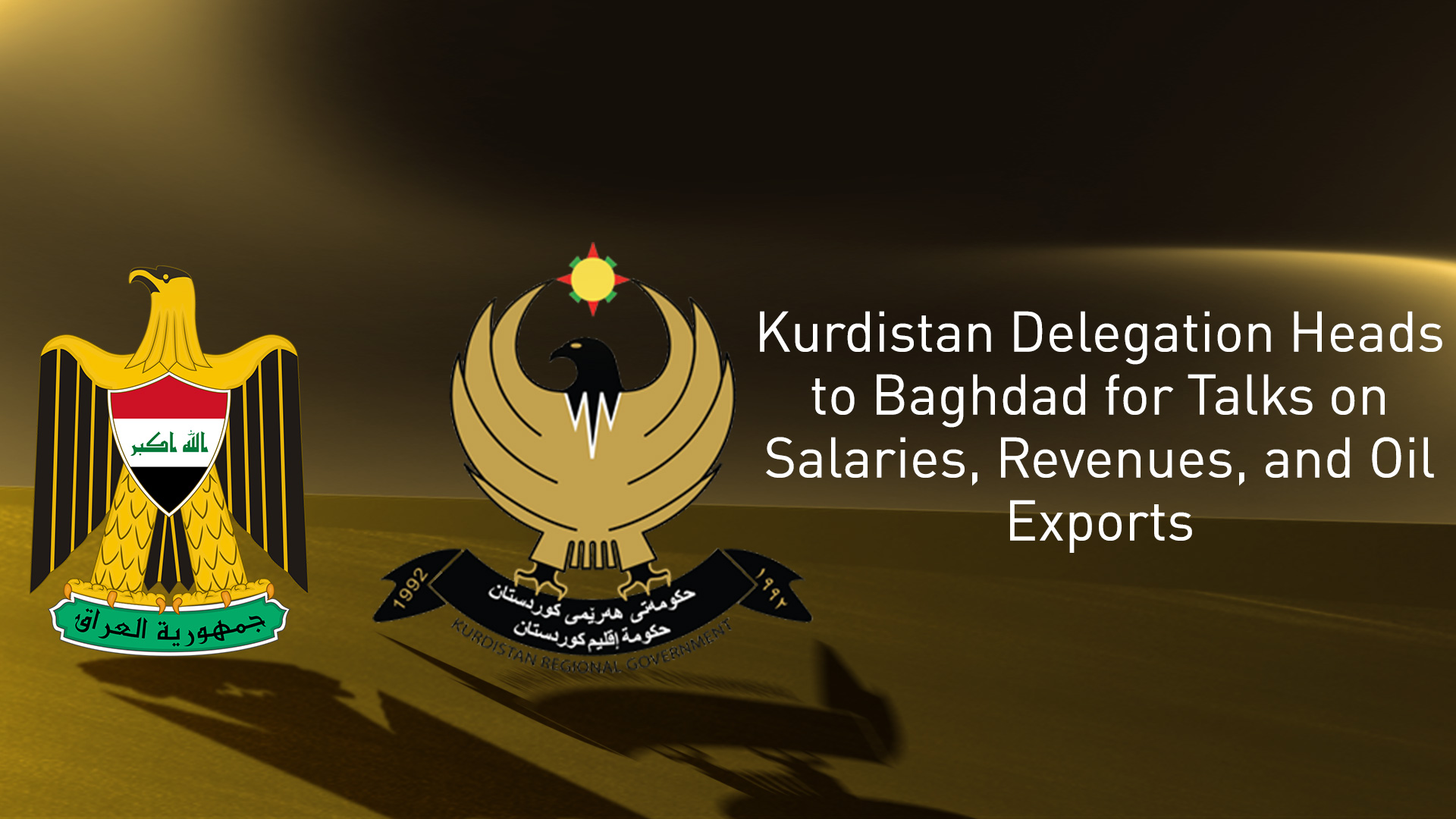Kurdistan Delegation Heads to Baghdad for Talks on Salaries, Revenues, and Oil Exports
An Iraqi Finance Ministry source told Kurdistan24 that salary disbursement for KRG civil servants will not proceed until the Iraqi Council of Ministers meets on Tuesday to approve a mechanism.

ERBIL (Kurdistan24) — A delegation from the Kurdistan Regional Government (KRG) is scheduled to travel to Baghdad on Sunday to continue negotiations with Iraqi officials over unresolved financial disputes and the disbursement of salaries, according to Kurdistan24’s correspondent in Baghdad, Dilan Barzan.
The visit comes less than a week after another KRG delegation met with Iraq’s Finance Minister Taif Sami to discuss federal budget allocations and oil revenues.
According to Barzan, two major issues remain unsettled between Erbil and Baghdad: the sharing of federal revenues—where Iraq has demanded 50 percent of the income from ministries it classifies as federal—and customs duties, which have yet to be standardized between the two governments.
An Iraqi Finance Ministry source told Kurdistan24 that salary disbursement for KRG civil servants will not proceed until the Iraqi Council of Ministers meets on Tuesday to approve a mechanism. The joint ministerial committees are expected to submit their final draft agreements to Prime Minister Mohammed Shia’ al-Sudani before any payments are authorized.
The talks also touch on the resumption of Kurdistan’s oil exports through Turkey’s Ceyhan port. Resuming exports has been suspended due to disputes between the Iraqi Oil Ministry and three U.S.-based companies operating in the Kurdistan Region. Baghdad has demanded revised terms, while the companies insist on guarantees for overdue financial entitlements, according to Kurdistan24 correspondent.
A source within Iraq’s Oil Ministry told Kurdistan24 that a draft agreement is “in its final stages.” Turkey has reportedly given its consent to resume exports once contracts are finalized. The U.S. Embassy in Baghdad has pressed both sides to reach a “tripartite arrangement” with the companies to safeguard their financial rights and expedite oil flows.
On August 20, a KRG delegation met Finance Minister Sami and agreed on allocations from non-oil revenues for July to December 2025, as well as revenue-sharing from border crossings. However, customs and taxation remain unresolved.
In parallel, both governments agreed to complete the process of transferring KRG civil servants’ salaries into the banking system by the end of this year.
The current disputes echo a long pattern of Baghdad’s failure to honor financial and political agreements with the Kurdistan Region. Since the fall of Saddam Hussein’s regime in 2003, successive Iraqi governments have repeatedly signed deals pledging to secure the constitutional rights of the Kurdish people but have consistently withheld budget allocations, delayed salary payments, and weaponized financial transfers to pressure Erbil politically.
Baghdad’s recurring policy of withholding the Kurdistan Region’s budget has had severe consequences, most notably in 2014 and again in 2020, when millions of Kurdish civil servants and their families were left without salaries for months. Such unilateral actions have not only strained the livelihoods of ordinary citizens but also undermined the spirit of the 2005 Iraqi Constitution, which enshrines Kurdistan’s autonomy and guarantees its share of national revenues. These measures have further deepened Kurdish mistrust toward Baghdad’s long-term intentions.
In more recent years, Baghdad has also sought to centralize control over oil and customs revenues in clear violation of constitutional provisions granting the Kurdistan Region authority to manage its natural resources. This approach has not only disrupted the Region’s economic development but has also stifled efforts to diversify non-oil sectors such as agriculture, industry, and tourism.
While Erbil has shown willingness to compromise and negotiate mechanisms for transparency, Baghdad has often turned agreements into political tools, releasing funds only when under pressure from international actors. For many Kurds, this pattern reflects not just financial mismanagement but a broader strategy of marginalization, designed to weaken the Region’s autonomy and deny it the economic independence necessary for stability and prosperity.
